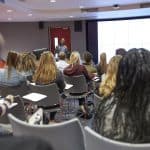Bradley Wilson didn’t want to sound cliché, but he couldn’t help saying he is taking each day “one day at a time.”
Wilson, an associate professor in the communications department at Midwestern State University in Wichita Falls, is not sure what the fall semester will bring when the university intends to resume in-person classes.
The state’s major university systems — the University of Texas, Texas Tech, and Texas A&M — all announced they plan to bring in-person classes back in the fall, with a public health caveat should conditions worsen. Some classes would remain online or in different formats. Several other higher educations have come out with their own announcements about intending to have students return to campus in the fall.
A chief concern for these programs is how to find the funding to keep them afloat. Some schools face enrollment shortfalls. Others are cutting some extra-curricular activities.
“The COVID-19 crisis has been more disruptive to our Texas higher education institutions than anything else we’ve seen since the end of the Second World War,” Harrison Keller, Commissioner of the Texas Higher Education Coordinating Board, said. “So it’s hard to overstate the impact of COVID-19 on our colleges and universities.”
The Texas Higher Education Coordinating Board launched a public/private partnership to bring emergency aid grants to the state’s two- and four-year colleges. They set a goal of $2 million for campus needs, to be distributed alongside federal CARES Act funding approved by Congress.
“These funds are going to help supplement with a little additional direct aid to students, they’re going to be able to help provide some indirect aid that campuses that run, for example, food banks or clothes closets that students and their families depend on,” Keller said.
“The campuses can also use these to help them stand up better campus capabilities so that they can get that emergency aid out in ways that are more targeted,” Keller explained.
Texas House Speaker Dennis Bonnen, R-Angleton, said April 30 state leaders are having conversations about these challenges “every single day.”
“All our institutions are struggling because the reality of it is — we are concerned, enrollment numbers are going down,” Bonnen said. “We don’t want fewer Texans being educated in Texas. We want to remove as many of those hurdles and obstacles to our students continuing their education or very importantly, beginning that education.”
Republican Gov. Greg Abbott said he had a recent conversation with Dr. Deborah Birx, Coronavirus Response Coordinator for the White House Coronavirus Task Force, about how to minimize risk when students return to school.
One suggestion discussed was starting the school year earlier and leaving more time for Winter Break.
“…with the concerns-slash-anticipation being that whether it be the common flu or the common flu combined with a resurgence of COVID, there may need to be a longer period of time during the winter.”
Originally posted on arklatexhomepage.com.





